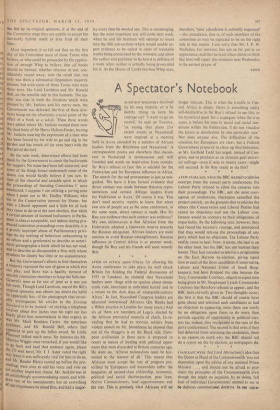AFTER AN ATTACK upon Ghana for allowing the Accra conference
to take place (as Well attack Britain for holding the Federal discussions of 1953 in London), he claimed that Nyasalarid leaders were 'thugs with no qualms about demo- cratic rule, interested in unbridled hatred and in a return to the dark days of nineteenth-century Africa.' In fact, Nyasaland Congress leaders are educated 'westernised' Africans. (Dr. Banda had a White practice in London for many years.) And six of them are members of Legco, elected by the African provincial councils of chiefs. Ins re- vealing that he had to restrain settlers from violent assault on Mr. Stonehouse he showed that not all the thuggery is on the Black side. Euro- pean civilisation in these parts is prepared to resort to means of dealing with political oppo- nents that were discarded in Britain centuries ago. He went on, 'African nationalism must be har- nessed to the interest of all.' This means that Africans must accept the rate of progress pre- scribed by Europeans and meanwhile suffer the inequities of second-class citizenship, economic, political and social discrimination, pass laws, Native Commissioners, land apportionment and the rest. This is precisely what Africans will no longer tolerate. This is what the trouble in Cen- tral Africa is about. There is something oddly self-destructive in Sir Roy's refusal to see this, in his hysterical quest for a scapegoat when the true cause is before his nose in social and racial con- ditions within the Federation. 'I do not visualise the future as domination by one particular race.' Nor does anyone else. The difficulties of the situation for Europeans are clear, but a Federal Government prepared to clean up discrimination, as Mr. Garfield Todd has urged, instead of Con- gress, and to proclaim as an ultimate goal univer- sal suffrage—even if only in twenty years—might still succeed. Is Sir Roy ready to do this?


















































 Previous page
Previous page